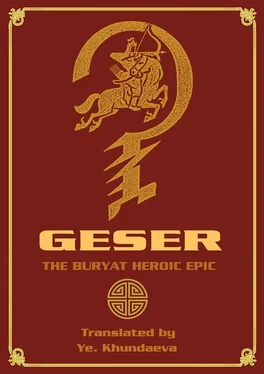Ye. Khundaeva - Geser. The Вuryat heroic epic
Здесь есть возможность читать онлайн «Ye. Khundaeva - Geser. The Вuryat heroic epic» — ознакомительный отрывок электронной книги совершенно бесплатно, а после прочтения отрывка купить полную версию. В некоторых случаях можно слушать аудио, скачать через торрент в формате fb2 и присутствует краткое содержание. ISBN: , Жанр: Языкознание, foreign_language, на английском языке. Описание произведения, (предисловие) а так же отзывы посетителей доступны на портале библиотеки ЛибКат.
- Название:Geser. The Вuryat heroic epic
- Автор:
- Жанр:
- Год:неизвестен
- ISBN:9785448558627
- Рейтинг книги:3 / 5. Голосов: 1
-
Избранное:Добавить в избранное
- Отзывы:
-
Ваша оценка:
- 60
- 1
- 2
- 3
- 4
- 5
Geser. The Вuryat heroic epic: краткое содержание, описание и аннотация
Предлагаем к чтению аннотацию, описание, краткое содержание или предисловие (зависит от того, что написал сам автор книги «Geser. The Вuryat heroic epic»). Если вы не нашли необходимую информацию о книге — напишите в комментариях, мы постараемся отыскать её.
Geser. The Вuryat heroic epic — читать онлайн ознакомительный отрывок
Ниже представлен текст книги, разбитый по страницам. Система сохранения места последней прочитанной страницы, позволяет с удобством читать онлайн бесплатно книгу «Geser. The Вuryat heroic epic», без необходимости каждый раз заново искать на чём Вы остановились. Поставьте закладку, и сможете в любой момент перейти на страницу, на которой закончили чтение.
Интервал:
Закладка:
Geser is a magician possessing the supersensitive abilities but he never boasts of it. The people like and respect Geser. He is industrious, possesses good skills for practical life, he is above all a good warrior. Geser is kind and open- handed, he is just and follows his principles. He can also control the atmospheric phenomena.
Geser is one of the sons of Khormusta tengri, residing in the Heaven, the highest sphere of the Universe. When there came the time of trouble and misfortune upon the Earth Geser was designed to descend to the Middle sphere (the Earth) to struggle against the evil and complete his mission of salvation of the people. He was born on the Earth an ugly (некрасивый) child, this is accounted for by the necessity for him to survive, it was kind of protection against the evil forces, the spirits and the like. When he was a child one of his names was Bukhe-Beligte (strong and gifted). Since childhood he was noted for his unusual gifts. He committed good deeds, displaying the magic abilities which helped him in doing good things. When he grows up he turns into a strong, well-built, handsome bator.
The three cosmic spheres are in his power. His origin is in the Sky, among the divinities. He lives on the Earth. He goes down to the Water kingdom, he establishes the ties with its Lord having married his daughter. Geser performs his deeds for the sake of the people, for their well-being and happiness.
A brief summary of the translating methods
The first translation to the English language of one of the Buryat variants of the heroic epic of “Geser” entitled “Abai Geser the Mighty” has been completed by Ye. Khundaeva. The lack of the full coincidence between the two languages and cultures made it hard to give an exact and accurate translation of all the passages of the epic.
In the Buryat language the nouns are too often substituted for by the pronouns. One can note a reverse order of the words in Buryat in contrast to English. Most peculiar are the paradigmatic and syntagmatic relations, phonoaesthetical words as well as the hyponymic relations, the frequent use of the various kinds of the particles, etc. However there are some similar features that are lacking in the other languages. Here one could mention the grammar expression of completeness (Perfect) or incompleteness (Non-Perfect or Progressive) of the action which are typical of the two languages: Buryat and English.
The Buryat language is noted for by the following features: the omission of the main parts of the sentence: the subject, the predicate and the object that are quite explicit and it is easy to restore them. One can note a reverse order of the words in Buryat in contrast to English. Most peculiar are the paradigmatic and syntagmatic relations, the phonoaesthetical words as well as the hyponymic relations, the frequent use of the various kinds of the particles, etc. Let us dwell on some of the methods used when translating the Buryat heroic epic “Geser” to the English language.
1. Lexical transformations
1.1. Transliteration
Transliteration is most often used, for example, when reproducing the proper names.
Малзан Гурмэн – Malzan Gurmen
Дашин Шөөхөр – Dashin Shokhor
Зарлиг Саган – Zarlig Sagan
Санхан Гоохон – Sankhan Gookhon
1.2. Loan translation
Бээжиин (мγр 3563) – печь (строка 3566) – stove (line 3564)
Yйлэнсүй (мγр 3705) – улица (строка 3705) – street (line 3705)
Мэшээг (мγр 3503) – мешков (строка 3504) – sack (line 3506)
2. The semantic transformations
2.1. Concretization and generalization
Орой дээрэм харыто (мγр 447) – Сверху меня опекайте (cтрока 447) – From heavens take care of me (line 448). Орой дээрэм (from above) might be translated as “from the heavens” using the semantical concretization that shows that the actions are undertaken as if by the will of the heavenly divinities.
Басагам (мγр 4226) – сынок (cтрока 4226) – sonny (line 4226). In the old times the boys were sometimes called “girls” lest they might be taken away by the evil spirits who wanted to harm the people. The spirits wanted to deprive the people of the sons for the boys were taken to be the successors of the kin or clan and bread-winners.
There are the lexical correspondences, such as the interlingual hyponymy and hyperonymy. These are the terms to designate the generic or specific relations. The word possessing a generic meaning can be taken as a hyperonym whereas the word possessing a specific meaning might be taken as a hyponym. For example, the word hараана (lily) is a hyponym in relation to the word seseg (flower) which is a hyperonym in relation to such words as badma seseg (lotus), urgy seseg (snowdrop). Jemes (berry) is a hyperonym of the word алирhан (bilberry), moihon (bird cherry). When translating one can replace a hyponym with a hyperonym if need be and vice versa.
In the English language most spread are the generic features represented by the words of the broad undifferentiated meaning. Compare the English and Russian sentences: Old birds are not to be caught with chaff. – Старого воробья на мякине не проведешь. Here we see that a broader notion bird is substituted for by a more concrete notion воробей (sparrow). In many languages such words as внук, внучка, внуки in Russian; grandson, granddaughter, grandchildren in English denote the offsprings both on the mother’s and father’s side whereas in Buryat the designations of such relatives on the part of the mother differ from those of the father. Thus they are as follows: zee – grandson, granddaughter (on the mother’s side); asha – grandson, granddaughter (on the father’s side).
2.2. Modulation
The method of modulation presents kind of the semantical development or integrated transformation. Мэдээн сайндаа мэдэбэ, yхаан сайндаа ойлгобо (мγр 119—120) – Ясным разумом понял, oстрым умом распознал (cтроки 119—120). – Perceived it in his quick mind and felt it very well (line 121—122).
The hero got the situation owing to his insight, he possesses the extrasensory abilities.
2.3. The lexical and semantic correspondencies
Абай Гэсэр хγбγγн (мγр 3116) – Абай Гэсэр Могучий (строка 3116) – Abai Geser the Mighty (line 3116). As it has been noted above the word хγбγγн possesses many meanings, among them “bogatyr” (mighty).
Abai is translated as “father, dear, honourable”. This is the most respectable form of addressing. The word хүбүүн has many meanings: son, boy, lad, guy, young man, brave spirit, daring fellow, very strong, leader, etc. Thus the word хүбүүн could be translated as mighty .
Халуу нугудаа (мγр 3341) – на родные луга (строка 3341) – Into my native meadows (line 3341) Халу has the meaning “hot”, but in this very case it could be understood as “native, one’s own”.
3. The lexical and grammar transformations
3.1. Breaking a sentence into a few parts
Далан долон таhалгай Үбдэгөө hайгаар ла Түльхэжэ инеэжэ, Үhүгыеө hайгаар ла Үдьхэлэжэ хаажа ла, Нэгэ дүнгөөр хаажа, Саа биедэн сараагүйеэр Ороо гэхэ юмэ лэ (мγр 5606—5614) – [Гэсэр] ударом сильного колена [Двери] открывает, Ударом сильной пятки [Те двери] захлопывает – Открывает лишь одним ударом, захлопывает лишь одним ударом, так вошел он в самую дальнюю из семидесяти семи комнат (строки 5606 – 5614) – [Geser] with the push of his strong knee opened [the doors], with the kick of his strong heel he closed [those doors]. He opened with only one push, he closed with only one kick. This way he entered the farthest of the seventy seven rooms (lines 5606 – 5614).
Читать дальшеИнтервал:
Закладка:
Похожие книги на «Geser. The Вuryat heroic epic»
Представляем Вашему вниманию похожие книги на «Geser. The Вuryat heroic epic» списком для выбора. Мы отобрали схожую по названию и смыслу литературу в надежде предоставить читателям больше вариантов отыскать новые, интересные, ещё непрочитанные произведения.
Обсуждение, отзывы о книге «Geser. The Вuryat heroic epic» и просто собственные мнения читателей. Оставьте ваши комментарии, напишите, что Вы думаете о произведении, его смысле или главных героях. Укажите что конкретно понравилось, а что нет, и почему Вы так считаете.











